
'Tis the season for a sitcom: Comedy is the real gift that keeps on giving
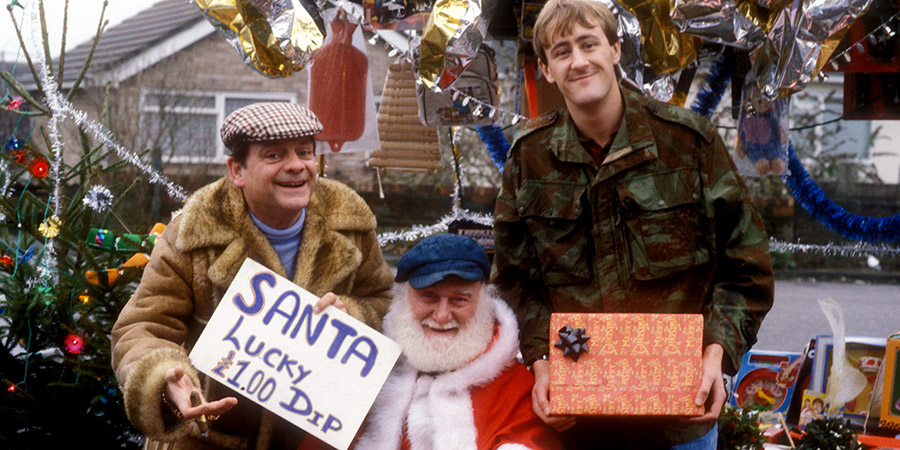
The festive season ought to be exceptionally fertile soil for the roots of a sitcom to flourish. After all, sitcoms are essentially about the frustrations of confinement, and there is no other time of the year when so many of us feel quite so confined, and quite so frustrated about it, than over the Christmas period.
Christmas is our sitcom. It's an episode, with a beginning, middle and end, in which we're most likely to act like sitcom characters act - bouncing off the walls, and off each other, as we feel we have no choice but to play out a plot over which it often feels as though we have barely any control.
This time, therefore, ought to be the time when the respective orbits of fiction and fact intersect, and viewers can feel closest to sharing the same situation as they've watched from a distance, on the screen, throughout the rest of the year. The irony, however, is that, traditionally, this is the season for sitcoms to be foggy, in the sense that most of them, most of the time, don't really seem to know how to engage with such an event.
Rather than seize on the chance, with a sly nod and a wink, to create an unusually intimate comic connection with their regular audience, some sitcoms appear to choke at the challenge of Christmas. They lose their nerve and settle for a strained sense of escapism instead.
Only Fools And Horses, for example, opted one Christmas to send Del and Rodney off to the English seaside, in warm(ish) and sunny(ish) Margate (1989's defiantly unseasonal but otherwise entertaining Jolly Boys' Outing) and then, towards the end of another December, off to the American seaside, in very hot and sunny Miami (1991's otherwise not quite so entertaining Miami Twice). The show did at least set its 1996 trilogy vaguely around the right sort of time of year, but, throughout the peak era of the programme, John Sullivan, Dickens fan though he was, seemed strangely disinclined to really explore and exploit this special season for its full comic potential.

Several other great British sitcoms have made, and in some cases keep making, the same strange mistake. If that's down to a fear of appearing too 'downbeat' on television's big and bright December night, then someone clearly forgot to send the same memo to the prime time soaps, and, besides, any self-respecting sitcom ought to relish the prospect of giving us, as Greg Lake would have put it, the Christmas that we deserve.
Humour is suited to unhappy holidays, to season's bleatings, to the snow that goes wrong. Conflict and crises are the Zuzu's petals of sitcoms, and Christmas, or whatever other name one wishes to give to this period, is the best time for George Bailey to hand them over with a carefree 'hee-haw' to the cruellest of our comedy writers.
The fact that we now live in an increasingly diverse, and an increasingly self-consciously diverse, ethnic and faith (and faithless) based culture ought to make this time of year even more, rather than less, suitable for an engagingly rich, painfully honest, and ultimately healingly inclusive, sitcom treatment, but still the spirit seems to sag more often than not.
It is a genuine pity, because, when sitcom writers do dare to embrace the festive experience, they have often been inspired to create some of the most memorable episodes of their respective series. Galton and Simpson, for example, conjured up multiple Christmas situations for Hancock and the Steptoes, and mined them for all they were worth, peering past the tinsel to see all the misery, insecurity, festering resentments, nagging irritations and indomitable longing lurking somewhere or other underneath.
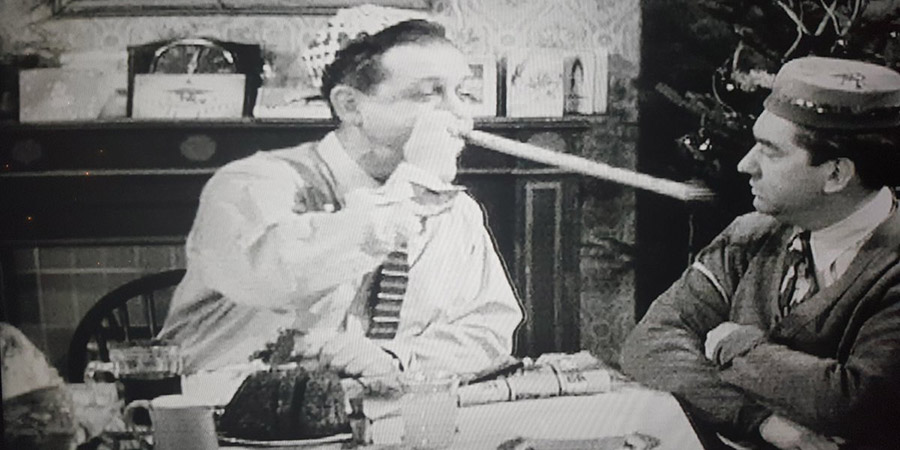
In Hancock's Happy Christmas (1956), for instance, Tony is in full-on misanthropic mode ('Christmas is going to be just like any other day in this house - dead miserable!'), trapped inside his cramped little home with a bunch of would-be revellers as he takes on every aspect of the festivities, from carol-singing children ('I hate kids! Horrible things! All skinny legs and big boots!') to excessive commercialism ('It's a racket! All the prices go up - you can spend POUNDS if you're not careful!'). His sense of Christmassy claustrophobia is cranked up even further when two fiercely combative orphans are foisted on him ('Come and have your dinner, you ungrateful little perishers!').
He fares no better in The Christmas Club (1959). Anticipating keenly the annual share-out of the Hand and Racquet slate club, Hancock is determined that this time he will face a veritable belt-strainer of a festive feast 'befitting a gourmet of my capacity' (instead of the turkey feet and chips he had to settle for the previous year), but, after Sid - of all people - accidentally gives all of the savings away to the Police Benevolent Fund collection, the feast has been rudely replaced with famine. 'I just can't get over it,' Hancock groans. 'The Welfare State and there's two men here who haven't got a crystallised tangerine to call their own!'
In The Party (1973), the two Steptoes are left to squirm together inside the Christmas cocoon that they are forced to share, with father Albert content for time to stand still as he wallows in the cosiness of it all, and son Harold desperate to find a way to wriggle out of it and fly far, far, away. It is, as usual with Steptoe And Son, a drama hijacked by laughs.
Harold has it all worked out. He has saved up for a travel ticket so that he can spend the season snoozing under the sun at the Hotel Miramar in Spain, and he has secured his father Albert a ticket to the old people's Christmas dinner down at the church hall, so that he can give him some much-needed peace. The ritual-revering Albert, however, has already hung the decorations up over the cistern in the outside loo, and is in no mood to have his annual routine disrupted, so he promptly plays on his son's always-vulnerable feelings of guilt with all the gusto of a pub pianist pounding away on the keys at party time:
HAROLD: Go on - take the ticket.
ALBERT: Keep the ticket! You can stick it in the khazi with the wrapping paper! And they can stuff their Christmas dinner - I ain't goin'! I've got me own home, and me own food - and me own son!
HAROLD: But I won't be here!
ALBERT: And I won't be there!
HAROLD: Why not?
ALBERT: 'Cos I won't!
HAROLD: Gimme a reason! Give me one good reason!
ALBERT: No!
HAROLD: Come on, gimme one!
ALBERT: No, I won't!
HAROLD: 'Cos you ain't got one!
ALBERT: Yes, I have!
HAROLD: THEN LET'S HEAR IT!!!
ALBERT: I don't want to embarrass you.
HAROLD: And what's that supposed to mean?
ALBERT: Well, if you can't see, it's no use talking about it.
HAROLD: But you can't just say that and finish the argument!
ALBERT: All right, then. It's for old people, isn't it? People with nowhere to go, with no one to look after them? Well, they all know about you down there. They'll start asking questions: 'Hello, where's Harold?' 'Oh, he's gone to Majorca to enjoy himself.' 'And left you all alone? Ah, you poor old-' Well, I'm not having that! I happen to be proud of you and I'm not having them talking like that about you. No, it'll be better if I just stay here by me self, and then they won't know.
HAROLD: You can't stay here by yourself.
ALBERT: Well, I've no option, have I? No, don't you worry. I'll be all right. There'll be plenty to do. [Stares tearfully into the distance] I'll go down to the cemetery, and sit with your mother for a while. Then I'll come back, have me little bit of dinner, pull a cracker with me self, put on a paper hat, and watch the telly. It'll only be for one day. I'll be in bed for the rest of the time.
HAROLD: [Sounding pained] You make it very easy, don't you?
ALBERT: It don't really matter. It'll probably be me last Christmas here anyway...
HAROLD: [Quietly] You've been saying that since 1955 and you're still here.
ALBERT: ...And then you'll be able to go to Majorca every year, won't you?
HAROLD: Yeah, well...I ain't gone and neither have you.
ALBERT: I don't particularly want to stay here another Christmas. Not without your mother. I'm getting very...tired...these days...I-I only keep going in order to look after you, and, now that you don't want me, I might just as well turn it in, and go up and join her...
The ruse works, as it always does. Come Christmas Day, there is Harold, still stuck in the same room as Albert, still doing the same things as usual, thinking the same thoughts as usual, feeling the same feelings as usual. 'I knew I'd be staying,' he mutters to himself bitterly. 'It's all a game now...'
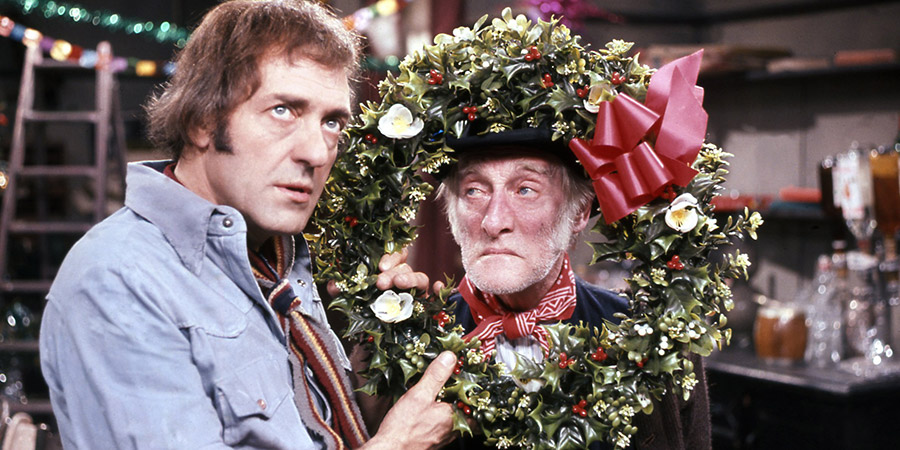
One year later, and this most un-superficial of sitcoms became so audacious that it even used part of its own Christmas special to mock the superficiality of most other Christmas specials:
ALBERT: We always have a good time.
HAROLD: We don't have a good time.
ALBERT: We get plenty to eat and drink.
HAROLD: We have too much to eat and drink. That is not 'enjoying' myself. That is boredom. One over-eats and over-drinks because one is bored. There's nothing else to do except stuff half-raw turkey, tinned Christmas pudding and tepid custard down one's cakehole.
ALBERT: Well, you can watch the telly.
HAROLD: I don't want to watch the telly. I watch the telly every Christmas, every day for three solid days. Watching the telly is the same as eating and drinking. One does it because one is bored. With Christmas. And all you get on the telly is Christmas stuffed down your cakehole. They all do something different for Christmas. Something 'special'. There'll be Z-Cars with holly stuck in their helmets, investigating a 'special' Christmas crime: someone found up an alleyway battered to death with a Christmas puddin'. And there'll be a Christmas Cilla, a Christmas Lulu, and a Christmas Muggeridge. And I'll bet you a pound to a penny that Cliff Richard will be singing Ave Maria with The Young Generation done up in habits! Split to the crutch, of course. There'll be a Christmas Coronation Street. Oh, there'll be a party at the Rover's Return - Albert Tatlock will be trying to have it away with Minnie Caldwell down the coal cellar. Well, not anymore! I'm not going through all that for another year, I'm sorry, no.
ALBERT: Well, I enjoy it. I like Christmas telly. All them stars giving up their Christmases just to entertain us!
HAROLD: They don't give up their Christmases! All them programmes is recorded in October! When it comes Christmas they're all away, sunning themselves in the South of France! It's just us lot sat here in the freezing cold watching 'em! Oh, you're so simple!
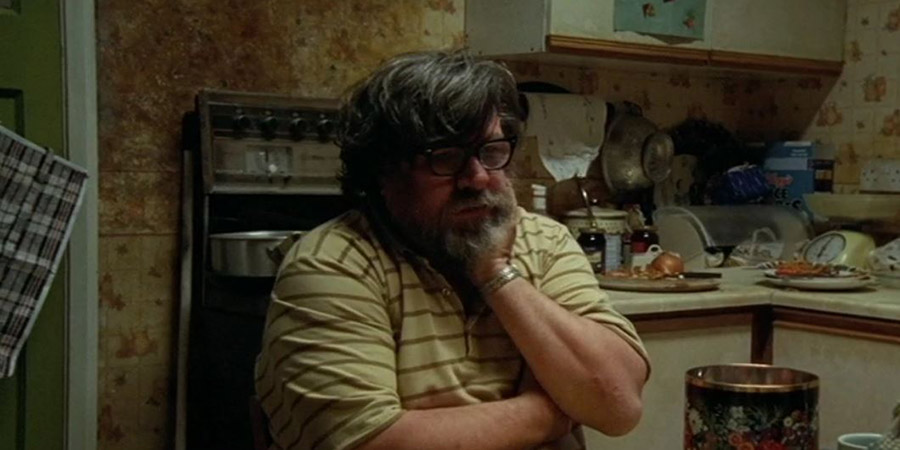
More recently, the comedy of Christmas has also been captured to memorable effect by the likes of The Royle Family and Absolutely Fabulous. The permanently resigned sense of confinement that defined The Royle Family meant that it could not have fled the festivities even if it had wanted to, and for its 2006 edition it added Nana in the back room to tighten up the tension, and had Jim sulking alone in the sepulchral gloom of his turkey-scented kitchen, cracking up, as some people tend to crack up at this time of year, over the most trivial of things:
DAVE: All right, Jim, what are you doin' in 'ere?
JIM: Haven't you bloody heard? The Queen of bloody Sheba in there has only stolen the batteries out of me bloody remote control!
DAVE: What for?
JIM: To fan her bloody self - that's what bloody for! So I had to sit for an hour watching Location, Location, Lo-bloody-cation!!!
DAVE: Well, why didn't you just turn it over at the telly?
JIM: Because that's what she wants - can't you see that? Me, up and down, like a blue-arsed fly?? She's the puppet master, pulling the strings - up and down, up and down!!! She's got Barbara wipin' her arse an' plucking her bloody chin every half an hour, and everyone else has to empty her bag because she's too lazy to go for a bloody piss! And do you know what the crafty arl cow's done now, the wicked arl witch? She's stole the bloody batteries out of my bloody remote! Ya know what? Everything in this house bloody revolves round her now!
DAVE: I've not noticed.
JIM: You've not noticed? Bloody hell lad, she's been lying flat on her back for the last six months where we used to sit and have our tea! And you haven't NOTICED?? Bloody hell, Dave! You go in there and you tell Barbara I will not set foot in that room until I get me bloody batteries back in that!!!
[Dave goes off to the living room]
DAVE: Barbara?
BARBARA: Yeah?
DAVE: Jim says he's not stepping foot in that room until he gets his batteries back.
BARBARA: Ooh, you see what I mean, Denise? Well, you can tell him to get off his big fat arse and go and get the batteries from the shop!
[Dave goes back to the kitchen]
DAVE: She said you can get off your big fat arse and go and get the batteries from the shop.
JIM: Well, you tell her that if I do have to go to the shop and buy batteries, that have been stolen from my bloody remote, I won't be coming back!
[Dave goes back to the living room]
DAVE: Barbara?
BARBARA: Yeah?
DAVE: ...Oh, hang on. [Goes back to the kitchen] What did you say again, Jim?
JIM: IF I HAVE TO GO TO THE SHOP AND BUY THE BLOODY BATTERIES, THAT HAVE BEEN STOLEN FROM MY REMOTE, I WON'T BE COMING BACK!
[Dave goes back to the living room]
DAVE: He says if he has got to go to the shop, he's never coming back.
BARBARA: Well, tell him if he thinks more of his remote control than he does of his own family he needn't bother coming back!
[Dave goes back to the kitchen]
DAVE: She said-
JIM: I KNOW what she said! I'm not bloody deaf, Dave!! I heard it! I heard it, you bloody great big streak of piss! Go on, PISS OFF!!!
[Dave goes back to the living room]
DAVE: I think he's mad at me, now, Barbara.
BARBARA: Oh, ignore him, Dave.
DENISE: Ignore him, babes.
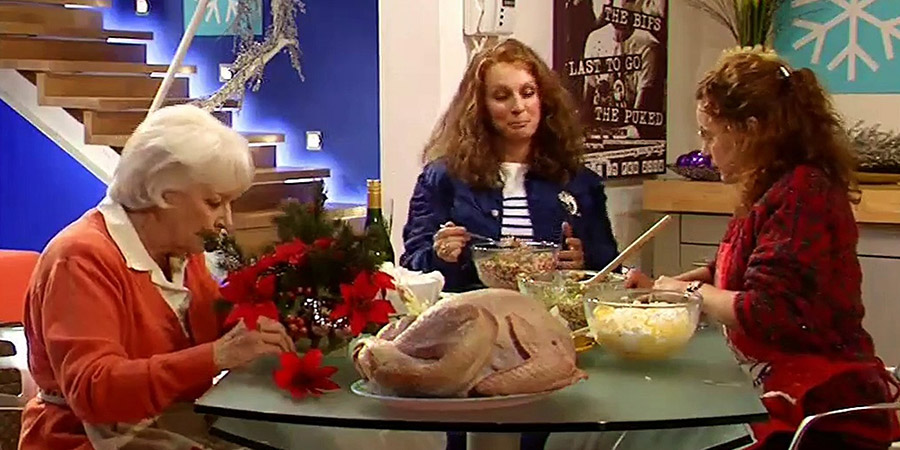
Similarly, for Christmas in 2003, Absolutely Fabulous had the normally winter-vacationing Patsy and Eddy invade their own home for the occasion, which was in turn invaded by various friends, frenemies and extended families. It is all too much for Patsy, who ends up in a hospital bed being drip-fed the basic ingredients of a pack of Benson & Hedges ('I'd rather be here than having Christmas. A few days on drugs - lovely'), and Eddy is too much for everyone else, especially her daughter, Saffy:
EDDY: Well, I'd better get on with my wrapping.
SAFFY: Yes, but nobody needs much - don't go over the top.
EDDY: I don't go over the top, darling!...Sweetheart, about little Lola's present, darling. You know you said 'Wendy House'? Well, darling, Bubble wondered if that was a Barratt home?
SAFFY: No!
EDDY: No, I said not, I said not, I didn't get one, I said no!...What have you got for Mama, darling, what have you got for me?
SAFFY: I'm not telling you.
EDDY: Yes, but if it's, you know-
SAFFY: It's the thought that counts.
EDDY: It's just the thought I'm worried about, darling. Because if the thought is 'Yardley'...
SAFFY: Stop it!
EDDY: It's just, sweetheart, you know, I have over-bought, and there's plenty of stuff in my room upstairs, darling, that I would like...
SAFFY: Will you just GO?
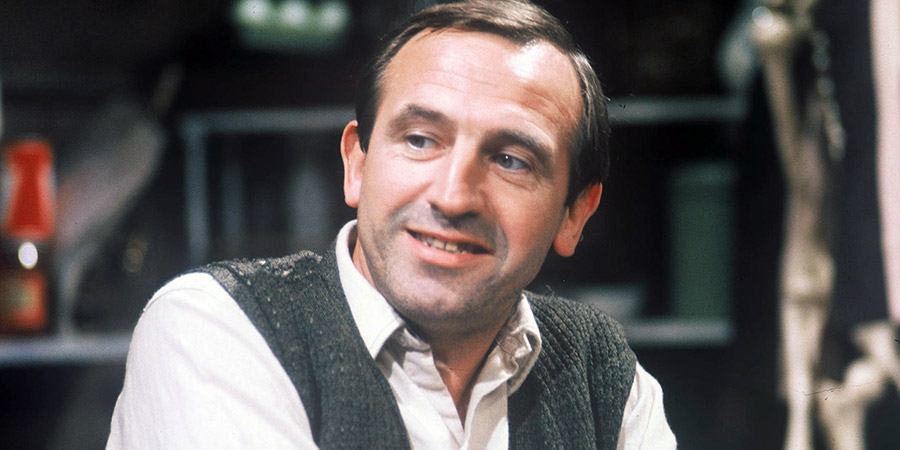
If any current sitcom maker needs just one more example, however, of the kind of starry heights that a sitcom can reach when it contemplates the context of Christmas, then they only have to consider what the writer Eric Chappell and the actor Leonard Rossiter created with the episode of Rising Damp entitled For The Man Who Has Everything (1975). This rarely-repeated but cleverly-crafted show manages to stuff the seasonal senses both of hell being other people and of hell being the absence of other people into its single comic stocking, and does it (aside from the odd burst of political incorrectness) extremely well.
It starts early on a cold and grey Boxing Day morning. Rigsby, dressed in an old over-washed shirt and multi-holed sleeveless cardigan, is sitting alone in his dingy basement kitchen, arms tightly folded, scowling at a cheap half-empty bottle of claret and an untouched cracker while he moans on and on to his cat: 'There's no doubt about it, there's been a definite decline in my popularity this year. Here we are, Boxing Day, and not one invitation to share the flowing bowl, not one request for my company around the piano, and I can't even find anyone to pull me cracker.'
Not even the cat, however, could care less about Rigsby, and he knows it. 'You're not bothered, are you?' he mutters. 'Just another day to you, isn't it? Just another day, another meal, another flower bed!'
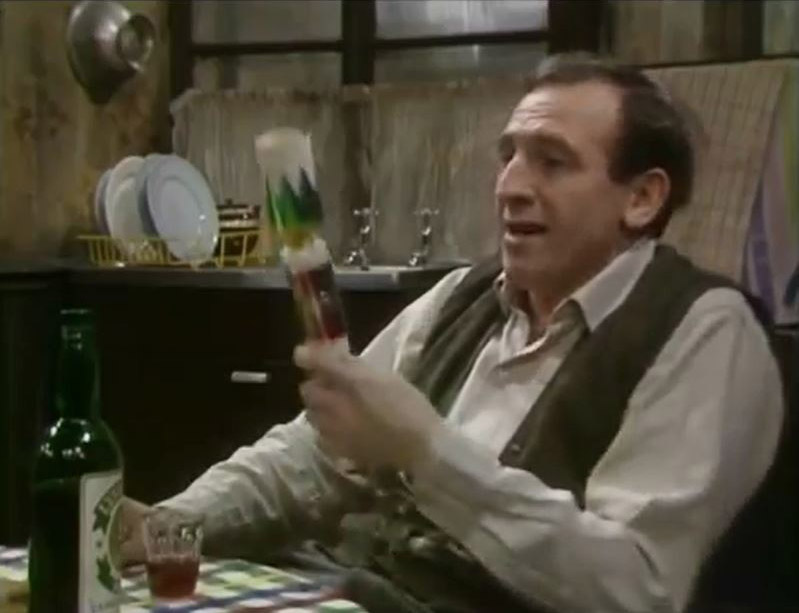
The chirpy milkman clink-clinks his bottles as he descends the steps and ventures inside in the vain hope of clawing a festive tip from his tight-fisted customer. The chances of that happening, however, are quickly diminished even further by his failure to bring any double cream for Rigsby's can of pineapple chunks.
'No wonder you're spending Christmas on your own, mate!' the milkman moans. 'As a matter of fact,' Rigsby lies, 'as a matter of fact I prefer spending Christmas on my own. I happen to believe this is a religious festival, all right? Quite happy here away from all the greed and hypocrisy. I happen to think Christmas is far too commercialised these days!' 'Not around here it isn't, mate!' sneers his visitor.
Eventually, Rigsby relents and hands the milkman a ten pence coin. The man pockets it and with a disgusted shake of his head he departs. 'Merry Christmas, Scrooge!' he shouts over his shoulder. 'Same to you, Speedy Gonzales!' Rigsby shouts back at him.
Now he is once again on his own, wandering aimlessly around his kitchen, looking at all the empty spaces. 'That mistletoe was a waste of money,' he mutters glumly, staring up at the pale greenery drooping down from the grubby ceiling. 'I don't see Sophia Loren popping in for a hot mince pie at this stage.'
Someone does pop in, however. It's the postmistress, who is excited that she has a card even for the lonely Rigsby. Lying desperately once again, he claims that he had told everyone that he was spending Christmas with his similarly unlovable brother, so all the other cards will have been sent straight there ('He's probably working on them with an ink rubber right now so he can use them next year').
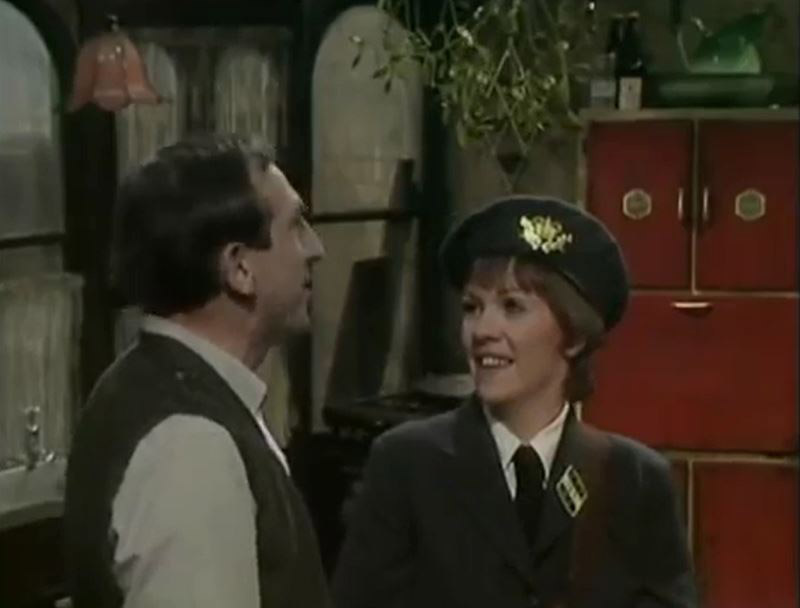
Sensing her sympathy, however, he manoeuvres her under the mistletoe and, puckering up, tries to take advantage of the situation, but she refuses to deliver a kiss: 'Mr Rigsby, please - you're tampering with the Royal Mail!' He affects complete indifference ('No skin off my nose - could've been your lucky day'), and she leaves.
Alone again, naturally, Rigsby opens his solitary card. Squinting at the inky inscription, he frowns and tosses it away. 'My God,' he grumbles, 'my writing's getting worse than ever!'
Just when it looks as though this will be the season for him to be solitary, however, his lodgers, and their female friends, start turning up. First it is Alan, the somewhat gullible student, who has crept back with his friend Brenda, having convinced himself that their landlord has indeed gone off to spend Christmas with his brother. Then it is Philip, the suave young man about town, who is not quite sure where their landlord is but has still arranged for his latest girlfriend, Lucy, to come by to share a pleasant weekend.
This sudden influx of other human beings leaves Rigsby reeling. He can never quite work out if it is all a present or a punishment.
Take the case of Alan, for example. He wanders down into the kitchen while Brenda is upstairs having a bath, and, when he is surprised to find Rigsby slouching about in there, he reaches into his pocket, finds some bath salts and hands them to his landlord, pretending that they are his present.
Rigsby, at first, is offended ('Are you suggesting I'm lacking in personal freshness?'), but then relents, reasoning inwardly that even this is better than nothing:
RIGSBY: I'm sorry, Alan, it's me. It's been so long since anybody...'ere, have a mince pie, have a drink. You're right, it's no fun having Christmas on your own, I realised that yesterday after dinner. There was no one to pull the wishbone with. Look: I had to do it all on me own.
ALAN: At least you got the wish - ha!
RIGSBY: It hasn't come true, though, has it? Unless you've seen a nubile young female floating around in her flimsy negligée.
This brings us to Brenda, whom Rigsby first sees, fresh from her bath, floating around in her flimsy negligée. She runs straight back upstairs upon seeing him, but Rigsby, having convinced himself that his wish has suddenly come true ('You don't think Father Christmas sent her, do you?' Alan protests. 'Well, I did want something warm for winter,' Rigsby replies with an excited smile. 'It beats stringback gloves and a chunky sweater!'), is up and about, brushing his oily hair, putting on his least-creased jacket and rubbing his bony hands together in anticipation of a rare amorous adventure. 'She promised me a kiss for Christmas,' he assures Alan, explaining that it happened when he unblocked her drains last July.
This brings us to Lucy, whom Rigsby first sees when he returns to the kitchen after meeting Philip on the stairs. Philip has told his landlord that he has put a present for him in the parlour. It is actually a bottle of extra-strong and fiery-tasting wine, which he hopes will scorch the throat before knocking the drinker out, but when Rigsby finds Lucy there in his lair he can hardly believe Philip's generosity.
'I don't know what to say,' he gasps after rushing back up the stairs. 'I'm overwhelmed!' Philip insists the gift is nothing, but Rigsby still can't stop smiling. 'Maybe not to you, mate, but it means a lot to me!'
So now Rigsby thinks that he's suddenly gone from being stuck on his own to being torn between two potential lovers. All of the festivities, however, soon fall horribly flat.
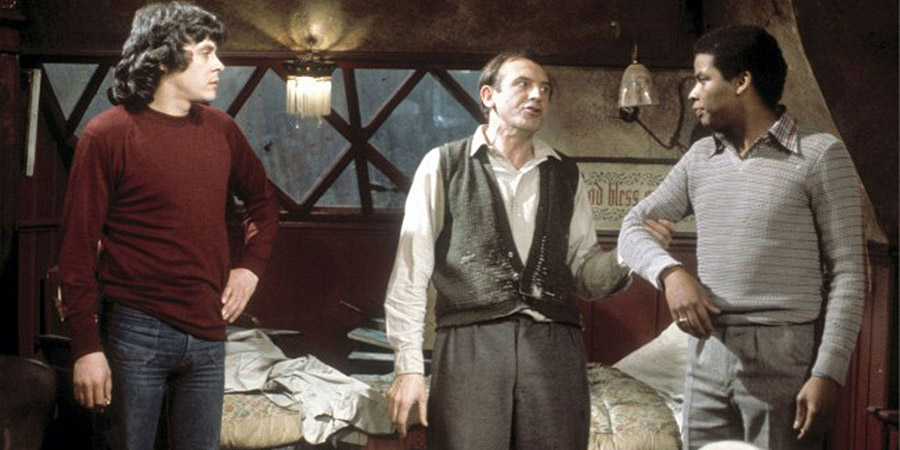
Alan and Philip can see it coming. 'If Rigsby played blind man's buff in a harem,' sniggers Alan, 'he'd end up with a eunuch.' Rigsby himself, however, remains too dazzled by the hope to see the imminent arrival of the despair.
His bid to win over Brenda in her bedroom ('Sitting downstairs I realised there was no one to crack me nuts for') ends abruptly when she gives him his real present - another jar of bath salts. Crestfallen, he thanks her half-heartedly and departs, and once he is outside her door he sniffs an armpit and kicks the cat.
He has no better luck with Lucy. No sooner does he get into position to pounce with a Christmas kiss than all of the other lodgers burst into the suddenly-crowded kitchen. Accepting a consolation glass of Philip's ultra-robust wine, he is immediately doubled over and gasping for air. 'The lining in me throat's gone,' he croaks, unable to protest as everyone else pats him on the back and goes off to have some fun.
In a cruel comic coda, it is at this point, with the breathless Rigsby once again on his own, that the postmistress returns. Feeling sorry for him, and now off-duty, she has come back to give him that longed-for Christmas kiss. Seeing her stand under the mistletoe and shut her eyes, Rigsby races to the sink to gargle with water and soothe his burning throat, only to spin around again and see the milkman burst in and take his place.
The other man thus gets the kiss. Rigsby is left with the double cream.
That is what Christmas tends to be like for someone such as Rigsby, or Hancock, or the Steptoes, or most of the other characters who live within the walls of our inescapable sitcoms. That is why, at this time of year, those of us looking in so often see ourselves looking back out.
Sitcoms make us laugh at who we are and how absurdly we sometimes act. There is no more suitable season to focus our minds on that invaluable fact, and no more fruitful a context for further fictions to be made which add to its humorous impact.
Your own Christmas, one hopes, will be far better than any of those that you happen to watch in such sitcoms. Even if it is not, however, at least the sight of the suffering on the other side of the screen might lend you some much-needed light relief.
Help us publish more great content by becoming a BCG Supporter. You'll be backing our mission to champion, celebrate and promote British comedy in all its forms: past, present and future.
We understand times are tough, but if you believe in the power of laughter we'd be honoured to have you join us. Advertising doesn't cover our costs, so every single donation matters and is put to good use. Thank you.
Love comedy? Find out more
